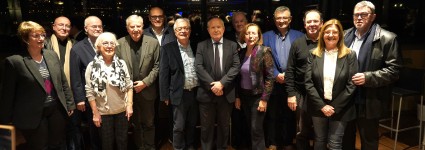Barcelona and its metropolitan area show improvements in the selective collection of waste and electricity consumption, but recent years have shown a stagnation of these positive data, which move the metropolis away from the sustainability goals set by the EU in 2030 and in 2050.
These data are part of the results of the report presented this Thursday by the Fundació Catalunya Europa "Climate change in the metropolitan area of Barcelona: towards a more sustainable and resilient urban model", carried out within the framework of the Re-City project , which has the support of the AMB, the Department of Territory and Sustainability of the Generalitat de Catalunya and Barcelona City Council. The study analyzes how climate change affects the metropolitan area of Barcelona and what is the state of adaptation and mitigation in relation to the climate emergency that is currently affecting us.
Gina Abelló, coordinator of Re-City and co-author of the study, explained how the data show that, in a context of global warming, we still cannot speak of an upward trend of tropical nights, warm days and higher average temperatures, but on the other hand, there has been an increase in the frequency of heat waves, which have gone from being a one-off phenomenon to being an annual phenomenon since 2015.
On the other hand, although the metropolitan population is growing, the use of resources is declining, both in the consumption of electricity and in the production of waste per capita. For example, the selective collection of waste has gone from 13% in 2000 to the current 36%, a good trend, despite having stagnated since the 2010s.
These indicators, however, are not homogeneous in the whole territory; the neighborhoods and towns with the highest incomes within the metropolitan area, present higher data on water consumption, electricity and use of private transport. This is what Isabelle Anguelovski, director of the Barcelona Laboratory for Urban Environmental Justice and Sustainability, has called “green privilege”, in other words, those who pollute the most are the ones who suffer the least from the effects of phenomena such as heat waves. in neighborhoods and towns with more presence of green areas. Anguelovski and Antonio Turiel, researcher at the Institute of Marine Sciences of the CSIC, have led a colloquium, moderated by the professor and advisor of the climate change program, Lorenzo Chelleri, where they have referred to the importance of not leaving anyone back when it comes to taking action to combat the climate emergency. "Some limitations, such as the ban on the entry of the most polluting cars in Barcelona, ??are being interpreted as harming people with low incomes. The gradation of policies is very complex, but more pedagogy should be possible, "said Turiel.
Inequality, then, is no stranger to the climate emergency. To deal with the climate emergency, without forgetting the most disadvantaged population, Anguelovski and Turiel pointed to two strategies, relocation and decentralization, that is, relocating to consume and work closer to where we live and decentralizing to contribute to improve the distribution of opportunities in cities and neighborhoods. Turiel also warned that economic growth is unsustainable in the long run: “There is still no value in saying that we cannot maintain permanent economic growth. What is needed is to ensure that this decrease does not lead to an increase in unemployment and poverty ", said this researcher and disseminator.
Ana Romero, Head of the Sustainability and Education Services of the AMB, also pointed out the importance of collaboration between the public and private sectors in order to move forward with renewable energies. Romero is also committed to strengthening metropolitan governance in order to improve the joint action of the local world. "Almost all AMB councils have an adaptation plan, but with different objectives," said the Head of Sustainability and Education Services.
To read the report, click here.








